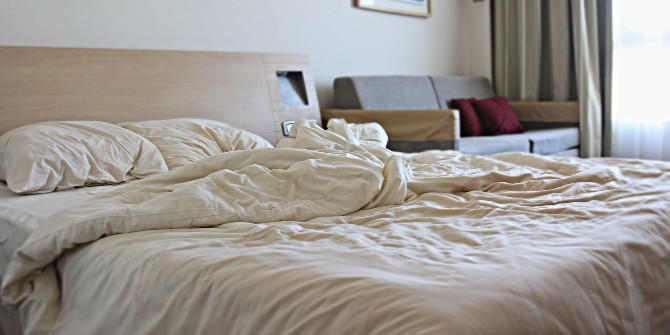For most of 2021, returning to the UK from a ‘high risk’ country meant paying for costly hotel quarantine. This was not compatible with the human right to return to one’s own country unhindered, says Aleksandra Jolkina (Queen Mary University of London).
For British citizens and residents with family in countries identified as ‘high risk’ for COVID, 1 November 2021 was a long-awaited day. The government removed the remaining seven countries from the ‘red list’, enabling people to return from them without being charged several thousand pounds to stay at a quarantine hotel.
The UK hotel quarantine scheme was introduced in mid-February 2021 amid concern about new COVID variants. Under the traffic light system, travel from ‘red’ countries was banned for everyone except British or Irish citizens and third-country nationals with residence rights in the UK. When returning from high-risk areas, those eligible for entry had to provide proof of a negative COVID test and book and pay for a ‘managed self-isolation package’ prior to departure – irrespective of their vaccination status.
The package included a ten-day stay at a designated hotel, airport transfer service and further COVID tests on days two and eight of their quarantine. Originally set at £1,750, the fee was later increased to £2,285 for a single adult. The price for an additional adult sharing the same room was £1,430, or £325 for a child aged five to 11. For a family of four staying in two rooms, the total quarantine costs could thus range from £4,570 to £7,430, depending on the children’s ages.
In February, when the scheme came into force, there were 33 countries on the ‘red list’, including most South American nations, Portugal, and large parts of Africa. The list was subsequently extended to over 50 states, including Ethiopia, India and Mexico, before being significantly cut in early October and ultimately abandoned in November. Legally, however, the hotel quarantine system remains in place. The UK transport secretary Grant Shapps has warned that the government may add countries and territories back onto the ‘red list’ if needed.
Over 200,000 people were forced to quarantine in hotels
The current easing of restrictions is likely to be of little comfort to over 200,000 British citizens and residents who have already passed through the expensive scheme, or those who could not afford to do so and were consequently prevented from travelling to the UK – possibly for several weeks or even months.

In May, the UK law firm PGMBM applied for judicial review of the policy on behalf of several British citizens who had to travel outside the UK for urgent family reasons. In one case, an NHS worker travelled to Ethiopia to visit his dying uncle and to care for his unwell mother. Shortly after his departure, Ethiopia was added to the ‘red list’ which meant he was unable to return to the UK as he could not afford to pay for hotel quarantine. Another claimant travelled to Pakistan to visit his critically ill father, who died shortly after his arrival. The man earned a minimum wage and was forced to use his family’s emergency savings to pay the upfront quarantine fee, putting his family’s ability to survive financially at risk.
The right to enter one’s own country
This situation does not seem to be easily compatible with the human right to return to one’s own country, which is protected under both international and UK domestic law. This right has been enshrined in several international human rights instruments, including the International Covenant on Civil and Political Rights (ICCPR) to which the UK is a party.
Article 12(4) of the ICCPR states that ‘no one shall be arbitrarily deprived of the right to enter his own country’. The UN Human Rights Committee noted that ‘[t]he scope of “his own country” is broader than the concept “country of his nationality”’ and ‘might embrace other categories of long-term residents’. The UK has not signed the First Optional Protocol to the ICCPR which allows individuals to make direct complaints to the Committee against their country. Nevertheless, it is fully bound by the Covenant provisions.
The right of return has also found expression in UK domestic law, most notably the Immigration Act 1971 which confers the right of abode on all British and certain Commonwealth citizens. Under Section 1(1) of the Act, all those with the right of abode ‘shall be free to live in, and to come and go into and from, the United Kingdom without let or hindrance’, except for the requirement to prove that he or she does have this right (such as to show a UK passport).
Although the British government did not expressly ban citizens from entering the country, as happened in Australia, the exercise of the right of return to the UK was effectively made conditional upon the payment of a quarantine fee. It is important to stress that passengers were obliged to book a quarantine package before beginning their journey back home. Guidance on the government’s website warned that someone could be fined up to £4,000 for not arranging a package before arriving in England, and would still have to pay for it on arrival.
The fee charged was high enough to make travelling to the UK difficult or even impossible
Normally, however, those who had not booked their quarantine would be denied boarding and thus physically prevented from returning to the UK. Under the government regulations, people travelling from ‘red’ countries had to provide a booking reference number for the quarantine package in a passenger locator form. The latter was to be checked by transport operators, who could be fined for not ensuring that the form contained the relevant number.
The concept of ‘essential travel’ has no basis in international human rights law
The requirement to pay for quarantine before arrival may be considered a direct limitation of the right of return. The fee charged was high enough to make travelling to the UK difficult or even impossible. This is not the free return without hindrance guaranteed under the Immigration Act.
Originally, the only group exempt from the obligation to pay the full fee upfront were recipients of income-related benefits, who could apply for a deferred repayment plan and pay the quarantine cost in 12 monthly instalments. It was only after PGMBM applied for judicial review that the government asked for a stay in the proceedings and allowed more people to apply for a repayment plan or, in ‘exceptionally limited circumstances’, to qualify for a fee reduction or waiver.
Nonetheless, eligibility for these new arrangements was restricted to people whose annual household income was under £13,800 before tax, who had dependents and significant care-related expenses, or relied on a pension or income-related benefits. Those who could use savings or take a loan to pay for quarantine were explicitly excluded. Moreover, the hardship arrangements were only available to those travelling for ‘essential’ reasons, which were defined as work, education, urgent medical treatment and compassionate reasons (for example, going abroad to visit a close family member who was dying or critically ill, or to attend the funeral of a close family member). Those who wished to visit family members who were not at the point of death were, hence, to be denied financial assistance in all circumstances, a situation which is difficult to justify. Although frequently used during the pandemic, the concept of ‘essential travel’ has no basis in the Immigration Act 1971 or relevant international human rights law. In other words, all people have a right to return to their own country irrespective of their reasons for being abroad.
Permissible limitations of the right to return
Under the ICCPR, deprivation of the right to return shall not be arbitrary. It must be suitable and appropriate for achieving the legitimate objective pursued, represent a means of last resort for which no less severe alternatives are available, and be proportionate. The Venice Commission, an advisory body of the Council of Europe, reiterated that governments should respect these principles when adopting emergency measures in response to the pandemic.
The requirement to quarantine in a hotel is a severe measure that may amount to deprivation of liberty under Article 5 of the European Convention on Human Rights and/or imprisonment under common law. It is thus possible that the legitimate aim – preventing the spread of new variants – could be achieved by less restrictive means, such as allowing returnees to self-isolate at home, particularly given that all of them had tested negative before departure and the number of those who tested positive during quarantine was very low.
Yet even if the hotel quarantine system itself were considered necessary and proportionate, the requirement to pay for quarantine does not directly contribute to preventing the spread of COVID. The operation of the scheme could have been paid for by the UK. Last, it is difficult to imagine how a fee that may force a person to exhaust their savings, go into debt and delay or prevent their return can be considered proportionate. As stressed by the Human Rights Committee, ‘there are few, if any, circumstances in which deprivation of the right to enter one’s own country could be reasonable’.
Who should bear the cost of quarantine?
The government’s approach towards mobile citizens and residents has been problematic. In public and political discourse, cross-border movement during the pandemic has been widely perceived as a matter of free choice rather than necessity, with those going abroad described in the media as ‘holidaymakers’.
The group most severely affected by the hotel quarantine scheme, however, is individuals with transnational connections that existed long before the pandemic. Apart from people on low incomes, the system may have had a disproportionate impact on people with foreign roots who are more likely to have families abroad.
Shifting the financial responsibility for managing the pandemic onto ordinary people is unfair at best, and unlawful at worst
Stories shared in dedicated social media groups reveal that people travelled to and from ‘red list’ countries for all kinds of pressing reasons – to bury their loved ones, care for their elderly parents, reunite with their spouses and children after months of separation, have surgery, work, study and volunteer at a refugee camp, to name a few. Knowing they would be unable to cover quarantine costs, many were deterred from going abroad to visit their ill relatives or wish them a final farewell.
Even in a pandemic, it is important to remember that people with transnational ties are an equal part of British society. The state has a duty to ensure their human rights are respected and carefully balanced against the potential risks. The government could recommend that people not travel to high-risk areas, but it should not create real or potential obstacles to the exercise of their right of return. To put it simply, if the state decides to run a hotel quarantine system, it should also be able to cover its costs. Shifting the financial responsibility for managing the pandemic onto ordinary people is unfair at best, and unlawful at worst.
This post represents the views of the author and not those of the COVID-19 blog, nor LSE.





Thank you for speaking out against this system that had so many detrimental effects including financial, mental and physical health.
Thank you for this article and for your research into this area. As a mother who has not seen her child for a year now and was due a reunion next week, my mental and emotional health has been severely affected by the new quarantine rules. The cost of having to pay for both her and I to hotel quarantine, plus the loss of income over 10 days as a self-employed person, plus the already devastated financial impact of lockdowns on my earnings make it an impossibility. I have no idea when I will be able to see my child again.I am heartbroken.